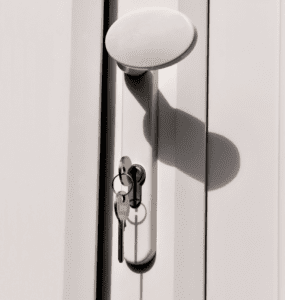As a professional locksmith, I understand the frustration of dealing with stuck keys. Whether it’s your home, office, or car, a stuck key can cause significant inconvenience and stress. However, before you panic and attempt to force the key, it’s essential to take a step back and employ the right techniques to avoid further damage. In this comprehensive guide, I will walk you through the common causes of stuck keys and provide expert tips to resolve the issue safely and effectively.
Understanding the Causes of Stuck Keys
 Misalignment: One of the most common reasons for a stuck key is misalignment within the lock mechanism. Over time, locks can wear out, leading to misaligned pins and tumblers that prevent the smooth insertion and removal of the key.
Misalignment: One of the most common reasons for a stuck key is misalignment within the lock mechanism. Over time, locks can wear out, leading to misaligned pins and tumblers that prevent the smooth insertion and removal of the key.
Dirt and Debris: Accumulation of dirt, dust, and debris within the lock can hinder the key’s movement. If the lock isn’t regularly cleaned and maintained, it can cause resistance, making it difficult to turn or remove the key.
Bent or Worn Keys: Regular use, improper handling, or exposure to harsh environments can cause keys to bend or wear down. A bent or worn key may not fit correctly into the lock, leading to a stuck key situation.
Broken Key: If the key breaks inside the lock, extracting it becomes a challenging task. Attempting to force the broken key out without proper tools can worsen the problem.
Expert Tips to Release Stuck Keys
Stay Calm: When you encounter a stuck key, the first rule is to remain calm and patient. Forcing the key may cause it to break inside the lock, escalating the problem.
Lubrication: A dry lock can often be the root cause of a stuck key. Use a silicone-based or graphite lubricant to free up the lock’s internal components. Avoid using oil-based lubricants as they can attract dirt and worsen the problem.
Jiggle the Key: Gently jiggle the key up and down while attempting to turn it. This movement can help align the pins and tumblers, allowing the key to slide in and out smoothly.
Clean the Lock: If you suspect dirt or debris is causing the issue, use compressed air to blow out any particles from the keyhole. You can also insert a small brush or cotton swab dipped in rubbing alcohol to clean the interior of the lock.
Use Graphite Powder: For locks that are prone to sticking, applying a small amount of graphite powder directly into the keyhole can improve its performance and prevent future sticking issues.
Try a Different Key: If you have a spare key, attempt to use it. Sometimes, the problem may be with the key itself, and using another one might resolve the issue.
Seek Professional Help: If the key remains stuck despite your best efforts, it’s time to call a professional locksmith. Attempting complex manoeuvres or using makeshift tools can lead to further damage and costly repairs.
Key Extraction by a Professional Locksmith
If the key breaks inside the lock, avoid any attempts to extract it yourself. Broken key extraction requires specialized tools and expertise to avoid damaging the lock further. A professional locksmith will have the necessary tools, skills, and experience to safely extract the broken key and, if needed, repair or replace the lock.
Dealing with a stuck key can be frustrating, but with the right approach and knowledge, you can often resolve the issue without causing further damage. Remember to stay calm, lubricate the lock, and clean the keyhole before attempting to use the key again. In cases of a broken key or persistent issue, it’s best to seek the assistance of a professional locksmith to ensure a safe and effective resolution. Proper maintenance and care of your locks can help prevent stuck key situations in the future, ensuring the security and convenience of your property.